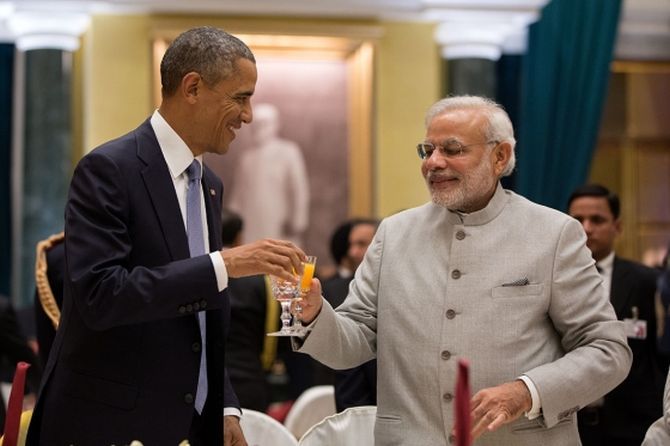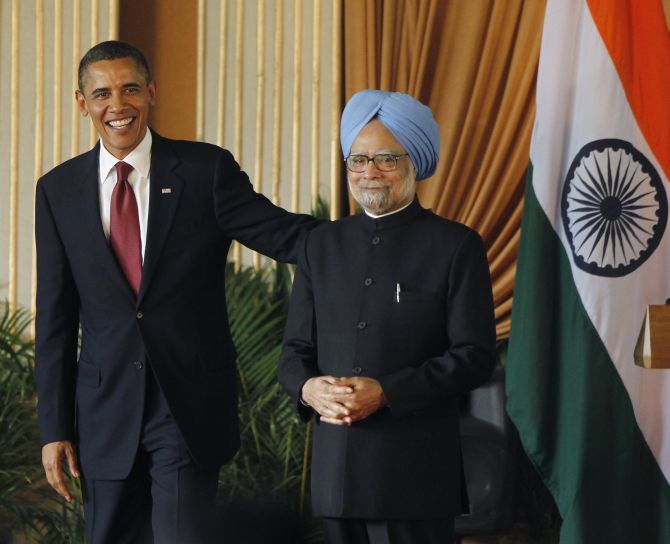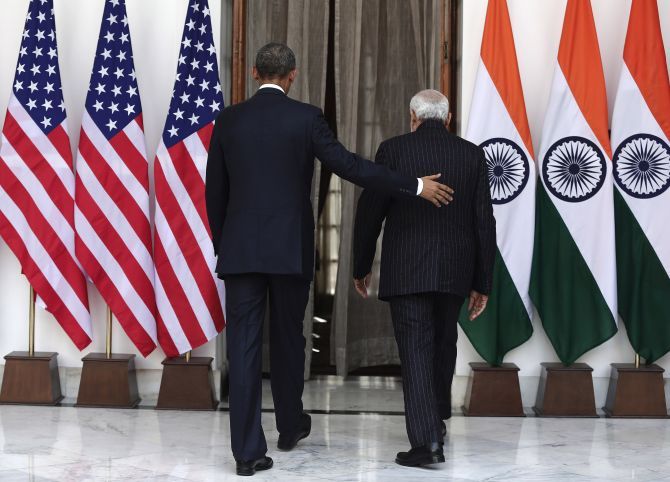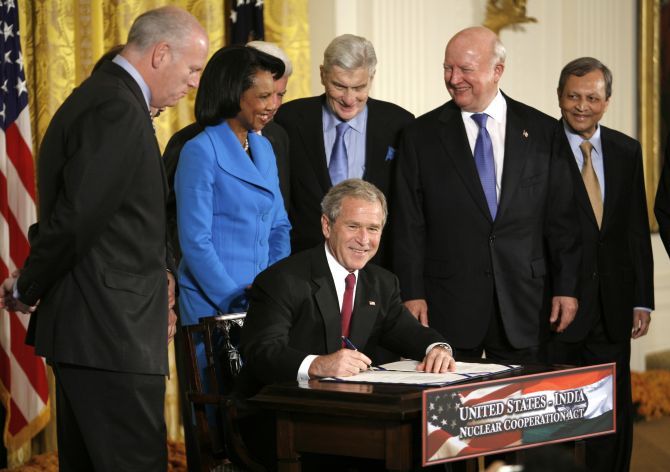'Prime Minister Modi's investment in the relationship with Washington is the biggest deliverable of this visit. He means business and that's fantastic!'

Mumbai-born Ashley J Tellis, one of the architects in negotiating the India-US nuclear deal during the Bush administration, reviews Barack Obama's New Delhi visit in an eloquent conversation with Aziz Haniffa/Rediff.com
What is your take on the Obama-Modi New Delhi summit? Beyond the optics and symbolism, did both sides walk the talk to produce meaningful outcomes?
President Obama's visit to India was a great success on multiple counts. It was undoubtedly rich in symbolism -- the fact that Prime Minister Modi invited Obama, the first US president to grace Republic Day as a chief guest, means a great deal -- and that the president moved the State of the Union address to go to New Delhi only drove that point home.
But beyond the symbolism, what did the visit achieve? To my mind, the most important outcome of the visit lay in the answer it provided to a vital, but intangible, question-- does Prime Minister Modi view the United States as a pre-eminent strategic partner for India?
Modi's personal history with Washington and the still challenging structural contradictions that define US-Indian relations do not make that answer either obvious or easy. Yet, the prime minister demonstrated, both through words and actions -- public and private -- this time around, that he conceives of the United States as a singularly important partner in his plans for India's transformation.
Unlike India's 'strategic' partnerships with many other countries, the relationship with Washington is indeed special because it is so fundamentally multidimensional -- it implicates geopolitics, national security, economics, technology, and inter-societal relations simultaneously, in a manner that is simply unmatched by any of India's other foreign affiliations.
For those at the US end who wondered whether Modi would follow in Atal Bihari Vajpayee and Manmohan Singh's footsteps where the United States was concerned, the events during Republic Day provided a resoundingly affirmative answer. And that should be sweet music to the ears of all those who have worked over the years for stronger US-India ties.
Beyond this central point, there were also tangible outcomes -- in fact, over 45 specific initiatives if my reading of the joint statement is correct. But I don't think you are interested in a recitation of minutiae and neither am I.
The big things for me were three -- the effort to resolve the civil nuclear imbroglio, the impetus given to expanded defence cooperation, and the precedent-setting declaration on the Asia-Pacific and the Indian Ocean.
Specifically, with regard to the nuclear deal, considering that you were one of the architects while serving in the Bush administration and helped negotiate it, how real is the contention by both leaders that they have achieved a breakthrough? And why is this so important?
I can't answer that question in any detail just yet, because I have not seen the fine print associated with the claimed breakthrough. But I hope it is a real resolution to the problems caused by India's liability law.
We worked really hard during the two terms of the Bush administration to get India to the point where it could be liberated from what Jaswant Singh had once famously called the 'nuclear apartheid' regime.
So it was particularly disappointing that just as we had crossed the finish line, India chose to shoot itself in the foot and enact legislation that potentially has the effect of destroying all private contributions to India's nuclear industry.
The irony could not be more galling -- after close to 30 years of isolation, sanctions, and coercion, the domestic Indian nuclear industry, which had survived against the odds, was threatened by demise because of what its own country's lawmakers had done, just as a friendly foreign partner was attempting to give it renewed lease of life!
I think this is a point that has been quite misunderstood in India and abroad. The chief victims of the Indian nuclear liability law are not American companies or foreign companies more generally.
The commentators who keep harping on how the law has penalised US nuclear companies are missing the most important fact -- that it undermines, first and foremost, India's myriad private companies who form the backbone of the nation's nuclear industry.
It is these companies that would be first at risk in case of a nuclear accident because they have primary assets in India that are in sharpest danger of attachment in case a litigant was to successfully seek damages against the suppliers as permitted by the current Indian law.
So fixing India's liability legislation is necessary, first and foremost, to protect India's private nuclear companies -- and only thereafter, their foreign counterparts.
I don't think the BJP (Bharatiya Janata Party) legislators, many of whom are now in the Modi government, understood the implications of what they were doing when they tried to embarrass Manmohan Singh by passing the Civil Liability for Nuclear Damage Act in 2010.
It is unfortunate that their shenanigans have now come to haunt Prime Minister Modi and India itself -- a responsibility that they must own up to, given that their government has now inherited the very problem that they have created.
So despite the euphoria, the devil is in the details, but no details have been disclosed and it's so short on specifics. So what is the solution that both sides are trumpeting as a breakthrough?
Again, this is a question that is hard to answer with specifics right now, because the details of the agreement are not yet public. But the broad solution, I think, will take the following form.
If you remember, the chief problems in the Indian liability law materialised in two forms. First, the law even while channelling liability to the operator -- as required by the international Convention on Supplementary Compensation -- provided the operator with the right to seek recourse -- meaning damages -- against the supplier in the event of an accident if it believed that defective components or mala fide actions were a probable cause, (Articles 17 b and c).
And, second, the law seemed to open the floodgates for all manner of other litigation against suppliers on other grounds, including possibly tort law, through its claim in Article 46 that the relief made available through the Act 'shall be in addition to, and not in derogation of, any other law for the time being in force.'
These two sections in the nuclear liability law have caused deep consternation to all private suppliers, both Indian and foreign. If a solution has in fact been found without seeking an amendment of the law, it probably takes the following form.
To the problems caused by Article 17 b, the Government of India is proposing an insurance pool that will be funded jointly by it and other public sector underwriters to the tune of, I believe, some $250 million, the amount that the law caps liability at.
Whether this insurance solution is satisfactory for private companies depends on whether the premiums are judged to be affordable and, most importantly, whether the insurance completely covers the totality of their liabilities in the event of an accident.
To the problems caused by Article 46, the Government of India seems to be offering a 'memorandum of law', that is, an authoritative assurance offered either by the attorney general of India or the ministry of law declaring that the burdens of Article 46 apply only to the operator and not to any supplier.
That supposedly should assure private suppliers that they do not incur any additional liabilities under other laws of the land -- an issue of great importance because the language in Article 46 is otherwise clumsy and ambiguous.

Will these solutions satisfy suppliers in India and the United States?
That is really the $64 million question. And without reading the text of the claimed breakthrough, it's really hard to say.
Clearly, the simplest and best solution all around would have been to amend the law. But for various reasons, including intra-BJP politics, the Modi government determined that it could not consider amending the law at this time. So it was left with no alternative but to devise stop gap solutions of this kind.
The painful truth is that any interim solutions of the sort advertised will work only until they are put to a real test -- in the aftermath of an accident.
Meaning that even if private companies are satisfied by these workarounds for the moment, there is no way to eliminate the fundamental uncertainty that arises from the fact that the larger problematic legislation still remains intact.
This issue is actually quite serious because in the event of an accident, the institutions that would finally adjudicate any litigation -- the courts in India -- are likely to take their bearings mainly from their reading of the current law and not necessarily from the workarounds agreed to by the Government of India and various private suppliers.
And therein lies the rub -- no one can guarantee a priori that the solutions now being proposed by the Government of India and which might be agreed to by various suppliers will ultimately be upheld by the courts if the judiciary's interpretation of what the law demands finally runs counter to what has been negotiated during the Obama visit.
This uncertainty is corrosive, especially where nuclear investments are concerned, because many billions of dollars are at issue.
The tragedy, at the end of the day, is that this entire mess was completely avoidable. If it were not for the willful perversity of a few BJP legislators in 2010, the Modi government -- and India as a whole -- would have been spared much grief.
Ambassador Richard Verma has said that the understanding was reached under the Indian system 'through a memorandum of law' and would not require additional legislation. Of course, he once served as the assistant secretary of state for legislative affairs, but will this fly and doesn't it need some kind of approval or review by the US Congress?
No, it does not need any review by Congress. In fact, strictly speaking, the Government of India's proposal does not even have to satisfy the US government. All it has to satisfy are the markets.
If private suppliers, Indian and foreign, are comfortable with the solution, the US government should be content to keep its nose out of this business.
The only reason the US government is involved in the first place is because the United States took the lead in pushing for adjusting India's status in the global non-proliferation regime.
As part of that process, India made certain commercial commitments to Washington and all that the US government is doing now is ensuring that those commitments are upheld -- even though the US government per se is not a supplier of nuclear fuel or reactors to anybody, including India.
On another issue: Do you think India will agree to any tracking of US nuclear material since it views it as a challenge to its sovereignty? Can the president waive this requirement which was a provision in the 2006 deal?
The issue of 'flagging' US-supplied fuel to India was discussed and resolved during the 123 negotiations. At that time, after much internal discussion, the Bush administration had determined that the president could uphold all his obligations under US law through the safeguards system overseen by the IAEA (International Atomic Energy Agency).
I don't understand why this issue has been resurrected since. But I'm glad that President Obama has, through his recent decision, reiterated the Bush position which was conveyed to India during the discussions leading up to the 123 Agreement.
Moving from the nuclear deal to defence cooperation and the US supply of sophisticated defence technology, co-production, and the decision to renew the US-India defence framework agreement, is this a significant development of this summit?
I think it is. Obviously, the items themselves that have been selected for co-development and co-production right now are modest, but it is proof of principle that is at stake.
This is the first time any foreign supplier has agreed to transfer advanced defence technologies to India and co-develop them further with New Delhi.
If this pilot effort works to the satisfaction of both sides, we will have opened the door to something really big, different, and important.
I am very bullish on US-Indian defence cooperation generally, but I think the real challenges now are in India -- not so much on the US side any longer.
India still has to make some important decisions about whether it wants to become a serious player in the global defence industry, and if it does, raising the foreign direct investment cap in defence to 100 per cent is long overdue.
This has nothing to do with domesticating advanced defence technology in India -- Indian policymakers seem to have completely misunderstood the connection between FDI limits and controlled technology.
Rather, increasing the FDI limits has everything to do with whether India can be integrated into the global supply chain, improve its domestic defence manufacturing base, and steadily acquire the managerial and technical skills to create a sophisticated defence industry at home.
In this context, the renewal of the defence framework agreement is important, but I would not overstate the significance of its renewal. It was bound to happen -- the more important question is whether both sides are willing to be truly ambitious is how they conceive of its implementation. I hope they are.

How excited are you on DTTI (Defence Trade and Technology Initiative), since your close friend Ash Carter, who was the author of the DTTI during his earlier incarnation at the Pentagon, will soon take over as US defence secretary?
I am delighted that Ash Carter will be back in the Pentagon, this time as secretary of defence. That is obviously good for India, but, more importantly, wonderful for the United States.
We have serious problems regarding national defence in our country. I imagine Ash will have his hands full managing those, though I expect he will give Frank Kendall (acquisition chief at the Pentagon) and others his fullest support as they work to take the US-India defence relationship forward.
If all of the breakthroughs during this summit that have been reported and spelled out in the joint statement, what does it say about Prime Minister Modi's 'can do' attitude?
It says a lot! Prime Minister Modi's investment in the relationship with Washington is to my mind the biggest 'deliverable' of this visit. He means business and that's fantastic. We've had more than our fair share of bad news on bilateral relations recently. It is indeed time for new beginnings.
Prime Minister Modi has demonstrated that he will not let the naysayers either in his own party or in the country get in the way of building a strong partnership with Washington -- because that is, in his judgement, fundamentally in India's own national interest.
It is really refreshing to be dealing at last with an Indian leader who not only believes this, but actually has the capacity to make it happen.

Is there something reminiscent -- a sense of deja vu in some ways -- about Obama's visit compared to that of President Bush and their respective visions for the US-India relationship?
I guess it's hard for the press to avoid comparisons! The visits by both presidents were undoubtedly great successes. Obama has persisted with the policy that Bush began in regard to India -- investing in a country whose destiny and trajectory are important to the United States, yet doing so when success is neither inevitable nor certain.
That requires vision and courage. Bush had it in spades, and Obama has shown that he is perfectly capable of emulating his predecessor when appropriate.
Your new report, Unity in Difference: Overcoming the US-India Divide, was released on the eve of the Obama-Modi Delhi summit. While expressing a sense of optimism, you went to great lengths to analyse the 'structural' contradictions in the relationship that must be overcome if the partnership is to be successful.
Has this summit overcome those contradictions?
I would be lying to you if I said that the recent Obama-Modi meeting resolved all the contradictions in the US-Indian relationship. The problems I flagged are indeed structural and will take a long time to overcome -- that will require quite a bit of discipline on both sides.
The basic point I made in the report is that, despite a common desire for a strong partnership, the United States and India are divided by disparities in their relative power, differences in their national priorities, and divergent worldviews.
Although it is impolite to say this, the fact of the matter is that the United States and India are not peers, their sovereign equality notwithstanding. So if the bilateral relationship is to flourish, Washington has to behave generously towards India.
I think US policymakers are still struggling to understand what this entails, but even when they get it, find such an approach hard to implement in practice. New Delhi can make it easier for them to do so -- by demonstrating special support for the United States occasionally on matters that Washington really cares about.
I hope the president's Republic Day visit strengthens the commitment on both sides to behaving in such complementary ways -- but we are not there yet.
Ambassador S Jaishankar has been appointed India's foreign secretary. What is your take on this latest development?
I think this news is the cherry on top! Ambassador Jaishankar has been a trusted adviser to Modi and the prime minister has been eager to have him at his side in Delhi for some time now.
It is, of course, great news for India that Jaishankar will be the foreign secretary, but it is also excellent news for us in the US since there is no one in the MEA bureaucracy, or indeed in the Government of India, who understands the importance of the US-India relationship as well as he does.










